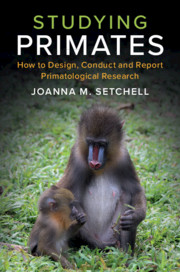Book contents
- Studying Primates
- Studying Primates
- Copyright page
- Dedication
- Contents
- Preface
- Acknowledgements
- 1 Asking Questions about Primates
- 2 Ethics in Primatology
- 3 Keeping Science Healthy: Research Integrity
- 4 Inclusive Science
- 5 Understanding Statistical Evidence
- 6 Communicating Ideas in Writing
- 7 Introduction to the Primates
- 8 Why Study Primates?
- 9 Identifying a Research Question
- 10 Finding Out What We Know
- 11 Reading Journal Articles
- 12 Formulating Hypotheses and Predictions and Designing a Study
- 13 Observing and Manipulating
- 14 Choosing Measures
- 15 Planning Data Analysis
- 16 Sampling and Statistical Power
- 17 Checking Feasibility and Finalising Your Plans
- 18 Writing a Research Proposal
- 19 Collecting Data
- 20 Conducting Fieldwork
- 21 Analysing and Interpreting Data
- 22 Writing a Scientific Report
- 23 Submitting to a Peer-Reviewed Journal
- 24 Presenting Your Work at a Conference
- 25 Conclusions
- Index
- References
1 - Asking Questions about Primates
Published online by Cambridge University Press: 19 September 2019
- Studying Primates
- Studying Primates
- Copyright page
- Dedication
- Contents
- Preface
- Acknowledgements
- 1 Asking Questions about Primates
- 2 Ethics in Primatology
- 3 Keeping Science Healthy: Research Integrity
- 4 Inclusive Science
- 5 Understanding Statistical Evidence
- 6 Communicating Ideas in Writing
- 7 Introduction to the Primates
- 8 Why Study Primates?
- 9 Identifying a Research Question
- 10 Finding Out What We Know
- 11 Reading Journal Articles
- 12 Formulating Hypotheses and Predictions and Designing a Study
- 13 Observing and Manipulating
- 14 Choosing Measures
- 15 Planning Data Analysis
- 16 Sampling and Statistical Power
- 17 Checking Feasibility and Finalising Your Plans
- 18 Writing a Research Proposal
- 19 Collecting Data
- 20 Conducting Fieldwork
- 21 Analysing and Interpreting Data
- 22 Writing a Scientific Report
- 23 Submitting to a Peer-Reviewed Journal
- 24 Presenting Your Work at a Conference
- 25 Conclusions
- Index
- References
Summary
Like all science, studying primates is about asking the right questions in the right way. Most studies of primates fall within the life sciences, so I focus on the scientific method in this book. This chapter introduces how science works, then what it takes to be a primatologist. I outline the contents of the rest of the book and highlight the importance of keeping science healthy. I end by emphasising the need to respect other people and to promote inclusive science.
- Type
- Chapter
- Information
- Studying PrimatesHow to Design, Conduct and Report Primatological Research, pp. 1 - 16Publisher: Cambridge University PressPrint publication year: 2019

